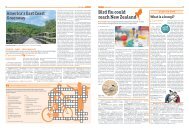Erfolgreiche ePaper selbst erstellen
Machen Sie aus Ihren PDF Publikationen ein blätterbares Flipbook mit unserer einzigartigen Google optimierten e-Paper Software.
Learning<br />
by Quizzing<br />
| Foto: Adobe Stock/Sanga<br />
Das Kundenportal der<br />
Sprachzeitung – das „mehr“<br />
zu jeder Ausgabe:<br />
• Interaktive Quiz-Serie und Übungen<br />
• Unterrichtsmaterial inkl. Lösungsteil<br />
als PDF zum Download<br />
• Audios und Bonusmaterial<br />
Gemeinsam <strong>mit</strong> den <strong>World</strong> <strong>and</strong> <strong>Press</strong> Sonderausgaben ist unsere<br />
beliebte Quiz-Serie entst<strong>and</strong>en. Wir wünschen viel Spaß beim<br />
Ausprobieren. Mehr gibt es im Kundenportal zu entdecken!<br />
Wer gewinnt 2024 den Kampf ums Weiße Haus?<br />
Wie beeinflusst Künstliche Intelligenz unseren Alltag?<br />
Woher kommt der Mythos des American Dream?<br />
Was geschah rund um die Krönung von Charles III.?<br />
Zu Ostern 10% günstiger!<br />
Abo upgraden und Zugang zum<br />
Kundenportal sichern<br />
Gratis-Probe<br />
Übungsmaterial<br />
→ Aktionscode: 240<br />
www.sprachzeitungen.de
Exam practice by Dr Hannah Lili Böttcher<br />
Want a glimpse of dystopia? Visit the self-service checkouts (663 words)<br />
<strong>World</strong> <strong>and</strong> <strong>Press</strong> • 2 nd November issue 2023 • page 2 page 1 of 4<br />
Exam Practice<br />
Topics: Automation • dystopia • artificial<br />
intelligence • society • technology<br />
Language variety: British English<br />
Answers: See pages 2 to 4<br />
| Image: Pixabay/Faisal Mehmood<br />
Assignments<br />
Task 1 – Comprehension<br />
Explain what the author, Adrian Chiles, believes to be dystopian about self-service checkouts.<br />
Task 2 – Analysis<br />
a) Analyse the syntax in paragraphs 3, 4, <strong>and</strong> 5.<br />
b) Analyse the author’s language use by grouping together examples <strong>and</strong> explaining them.<br />
Task 3 – Evaluation<br />
Do you believe the development towards more <strong>and</strong> more self-service checkouts point towards a utopian<br />
or dystopian future? List advantages <strong>and</strong> disadvantages <strong>and</strong> include this cartoon in your pro-<strong>and</strong>-con-list:<br />
• Cartoon by Trevor White captioned “I just want to interact with another human being...”, published by<br />
Cartoonstock, 25 Feb., 2022, search ID CS570316<br />
© 2023 Carl Ed. Schünemann KG. Alle Rechte vorbehalten.
Want a glimpse of dystopia? Visit the self-service checkouts<br />
<strong>World</strong> <strong>and</strong> <strong>Press</strong> • November 2 / 2023 • page 2 page 2 of 4<br />
Answer key<br />
Assignments<br />
Task 1: Comprehension<br />
Sample points<br />
• The author believes self-service checkouts to be dystopian because they are slowly but steadily<br />
replacing the staffed checkouts, a process he calls “the death march of progress” (paras. 1–3).<br />
• What annoys him is that some self-service checkouts are always out of action while the rest of them do<br />
not work properly either (para. 3). By quoting the woman working in the supermarket, he also addresses<br />
the fact that automated tills are a problem for elderly <strong>and</strong> disabled people (para. 6).<br />
• Another negative factor is the fact that you cannot just exit the self-service area. Measures against shop<br />
theft involve that you scan the barcode on your receipt in order to be able to leave. This would make<br />
everything more tedious <strong>and</strong> harder for people. He thinks this would pose a challenge for elderly people<br />
like his father who might be able to operate the self-service checkout but would possibly get stuck trying<br />
to leave the supermarket (para. 5). This is almost like a nightmare that you cannot escape.<br />
• He believes the “[t]ipping point” was reached when the self-service checkouts outnumbered the human<br />
ones; to him, this is of great concern (“[e]xtinction loomed”, para. 4), <strong>and</strong> he paints a gloomy future<br />
scenario in which the human-operated tills will be a relic of the past <strong>and</strong> something that can be looked<br />
at only in a museum where they will be laughed at by the younger generations (para. 7).<br />
• Finally, using humour <strong>and</strong> exaggeration, he paints a dystopian picture of the future. He (self-mockingly)<br />
includes himself among the “[h]uman checkout enthusiasts” who will be tracked down by the AI police<br />
as “degenerate counter-revolutionaries” <strong>and</strong> displaced to some distant railway arches where they will<br />
“play pretend shops” at risk of being captured <strong>and</strong> killed by the government (para. 9).<br />
Task 2: Analysis<br />
Sample points<br />
a) Syntax: There are many short <strong>and</strong> incomplete sentences, for example, “A zero-sum game” (para. 3),<br />
“Tipping point. Extinction loomed.” (para. 4), “So cruel.” (para. 5). This feels like the author allows the<br />
reader to hear his unfiltered inner thoughts. The language is informal <strong>and</strong> expresses the author’s<br />
personal involvement with the topic. Together with spoken language (para. 5), this adds a sense of<br />
immediacy <strong>and</strong> alarm to the author’s message.<br />
b) Language use:<br />
• Exaggeration: He often exaggerates <strong>and</strong> uses dramatic vocabulary in order to support <strong>and</strong> stress<br />
his point about how awful the automated tills are (e.g., “my mood darkens”, “death march”, para. 1;<br />
“[e]xtinction”, para. 4; comparing self-service checkouts to a dystopia).<br />
• Slang: The author makes use of colloquial expressions (e.g., “fresh hell”, “beavered away”, “I<br />
shambled out”, paras. 5, 7, 8), which contributes to the immediacy of his message <strong>and</strong> his informal tone<br />
of writing.<br />
• Tone: In general, the article is written in an informal <strong>and</strong> humorous but also sarcastic <strong>and</strong> selfdeprecating<br />
tone. While being obviously annoyed <strong>and</strong> worried by the self-service checkouts, he adds<br />
some funny anecdotes, like the one about the dried-out geraniums (para. 3), his imagination how<br />
children will laugh at the human tills in museums, <strong>and</strong> how he <strong>and</strong> other supporters of human-operated<br />
tills will be outlawed by the AI police (para. 9). In some remarks (e. g., “our tender eyes”, para. 8),<br />
anecdotes (his struggle with the geraniums, para. 3; he <strong>and</strong> other people underestimating the<br />
development, para. 2), exaggerations (see above), <strong>and</strong> descriptions (“Human checkout enthusiasts,<br />
para. 9), he makes it clear that he is being self-deprecating.<br />
© 2023 Carl Ed. Schünemann KG. Alle Rechte vorbehalten.
Want a glimpse of dystopia? Visit the self-service checkouts<br />
<strong>World</strong> <strong>and</strong> <strong>Press</strong> • November 2 / 2023 • page 2 page 3 of 4<br />
• Inner thoughts <strong>and</strong> use of contrast: He shares his inner thoughts (e. g., para. 5) by a quick<br />
succession of questions <strong>and</strong> answers <strong>and</strong> what he imagines other people’s reactions would be. Again,<br />
this, adds to the immediacy <strong>and</strong> his personal involvement in the topic. At times, it feels almost as if he<br />
were talking to himself (e. g., “That’s useful, I suppose.”, para. 5). In the concluding paragraph, he gets<br />
to the heart of his dystopian vision by contrasting what he expects to be the future (“Yes, …. No, ….”,<br />
para. 9).<br />
• Dialogues <strong>and</strong> address of the reader: The language is very lively, which is also achieved by<br />
including dialogues in the article (e.g., para. 6) as well as addressing the reader directly (“Oh yes,<br />
my friends, now you have to swipe a barcode on your receipt to be released.” para. 5).<br />
Figures of speech:<br />
• Metaphors:<br />
◦ “the death march of progress” (para. 1) – also oxymoron, a combination of two normally<br />
contradictory terms, as a death march is not normally associated with progress but with the opposite.<br />
◦ “next wave in the deluge” (para. 4): Metaphors are figures of speech that describe one thing in<br />
terms of another. Here, progress, normally associated with something positive <strong>and</strong> innovative, is<br />
compared to death (i.e., the ultimate end <strong>and</strong> thereby the opposite of progress). In the second<br />
example, the constantly growing numbers of automated tills are compared to a flood that sweeps<br />
everything away <strong>and</strong> where there is no chance to escape from it.<br />
• Antithesis <strong>and</strong> parallelism: “A h<strong>and</strong>ful of self-checkouts appeared; a h<strong>and</strong>ful of human ones<br />
vanished.” (para. 2): This juxtaposition of contrasting ideas in parallel structure is an indicator of the<br />
immediacy of what is at stake: the moment automated tills took over, human-operated ones were<br />
stopped. By juxtaposing these two phrases, the author points out how the one “supermarket reality”<br />
superseded the other.<br />
• Personification: “Still more territory has now been swallowed up by a dozen new, bigger auto-tills …”<br />
(para. 4). Here, the inanimate auto-tills are given human qualities, thereby also alluding to the idea that<br />
their presence is a threatening invasion.<br />
Task 3: Evaluation<br />
Individual answers; sample points<br />
Advantages<br />
• Self-service checkouts might be faster than human tills, which could be an advantage for the shop <strong>and</strong><br />
its customers, especially during busy working hours.<br />
• It saves the shops money because they need less staff. This would mean more profit – either if the<br />
shops keep the money or if they reinvest it <strong>and</strong> attract more customers with reduced prices.<br />
• By spending less money on staff, shops could provide more self-service checkouts <strong>and</strong> save customers<br />
more time.<br />
• Labour shortages at shops would be less of a problem because fewer members of staff are needed.<br />
• Self-service checkouts take up less space than human-operated ones.<br />
• During the Covid-19 p<strong>and</strong>emic, self-service checkouts reduced the risk of contagion.<br />
• Shops entirely based on self-service have been opened in rural places <strong>and</strong> make life in the countryside<br />
much easier.<br />
• Conclusion: This points towards a utopian future in which a greater use of machines not only helps<br />
humans to save time <strong>and</strong> money but also liberates them from monotonous <strong>and</strong> repetitive tasks like<br />
operating a supermarket check-out. Human beings will profit more from this than they would be harmed.<br />
Rural areas would benefit <strong>and</strong> the economy would profit financially by saving companies money as well<br />
as in terms of labour shortages because more machines would reduce the need for human workers.<br />
© 2023 Carl Ed. Schünemann KG. Alle Rechte vorbehalten.
Want a glimpse of dystopia? Visit the self-service checkouts<br />
<strong>World</strong> <strong>and</strong> <strong>Press</strong> • November 2 / 2023 • page 2 page 4 of 4<br />
Disadvantages<br />
• Self-service checkouts might not necessarily be faster than human-operated ones, especially if there is<br />
a glitch (which very likely will happen), <strong>and</strong> it turns into a bigger technical problem than a member of<br />
staff could fix immediately at a human till.<br />
• It’s absurd when a member of staff needs to fix a glitch at a machine that’s supposed to reduce the<br />
amount of human time spent on it.<br />
• People working at the checkouts might lose their jobs, which leads to more unemployment.<br />
• You need some practice, especially with products that don’t have a scan code, like fresh vegetables<br />
<strong>and</strong> fruit, fresh bread, or reduced items.<br />
• Some groups of people, for example, elderly or disabled ones, might have huge difficulties operating<br />
the self-service checkouts because these tills are not necessarily user-friendly or accessible for people<br />
with disabilities or without a lot of technical knowledge.<br />
• As is shown in the cartoon, there is no more human interaction at the till when you only have selfservice<br />
checkouts. However, talking to a real person when you do your shopping is an important part of<br />
some customers’ social interaction during the day, especially elderly <strong>and</strong> lonely people, so this could<br />
lead to more loneliness among certain parts of the population. The p<strong>and</strong>emic showed how the loss of<br />
everyday contact can affect people.<br />
• Automated checkouts make the whole shopping experience much more anonymous. There are even<br />
self-service shops with no staff at all.<br />
• The risk of shop theft is greater.<br />
• Conclusion: This points towards a dystopian future in which a greater use of machines will cause more<br />
harm than good. Social interaction would be reduced more <strong>and</strong> more, which would in turn affect<br />
people’s mental health. The development puts people who have a harder time using machines at a<br />
disadvantage. Furthermore, human beings would be made redundant, which would harm the economy<br />
due to higher unemployment. Machines also make or have pre-programmed errors, <strong>and</strong> the more<br />
people rely on them, the greater the risk that these become harder <strong>and</strong> harder to fix.<br />
<strong>World</strong> <strong>and</strong> <strong>Press</strong> im Klassensatz: Sichern Sie sich Ihre Vorteile. Jetzt hier bestellen!<br />
Hinweis: Die Zugangsdaten zu Ihrem persönlichen Abo dürfen Sie nicht an Dritte weitergeben.<br />
© 2023 Carl Ed. Schünemann KG. Alle Rechte vorbehalten.
















